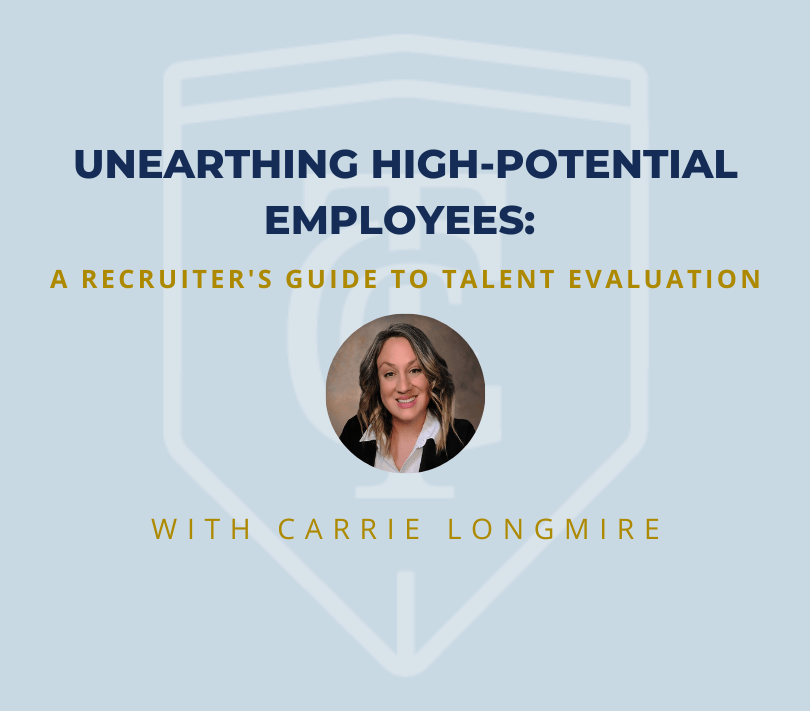
As a recruiter who interacts with highly sought-after talent day in and day out, I’ve had the privilege of honing my skills in identifying high-potential employees. In this post, I will share my insights and experiences, discussing key traits to look for, strategies for talent evaluation, and how to listen effectively during interviews to unearth high-potential talent. Additionally, we’ll delve into the motivational drivers that underpin high-potential candidates and offer additional insights to help you make the best hiring decisions.
Identifying Key Traits
Adaptability: High-potential employees possess a remarkable ability to adapt to new situations and thrive in changing environments. Look for candidates who have a track record of successfully navigating different challenges and demonstrating flexibility.
Initiative: These individuals are proactive self-starters. They don’t wait for instructions but take the initiative to identify problems and offer solutions. During interviews, ask about specific instances where candidates have gone above and beyond their job description.
Continuous Learners: High-potential employees are lifelong learners who constantly seek opportunities for growth and improvement. Look for signs of candidates who invest in their personal and professional development, such as pursuing certifications, attending workshops, or participating in online courses.
Problem-Solving Skills: The ability to analyze complex problems and devise effective solutions is a hallmark of high-potential talent. Listen for examples of candidates tackling challenging issues in their previous roles and the outcomes they achieved.
Leadership Potential: While not all high-potential employees aspire to traditional leadership roles, they often exhibit leadership qualities, such as influencing others, inspiring colleagues, or taking on leadership responsibilities in volunteer activities.
Evaluating Talent
Interviews: Consider using a different approach to interviews called “Situational Interviews” or “Scenario-Based Interviews.” These interviews focus on hypothetical situations and ask candidates how they would handle or respond to them. Here’s how you can implement this approach.
Describe a Hypothetical Scenario: Instead of asking candidates about their past experiences, present them with a hypothetical work-related situation relevant to the job they are interviewing for. This scenario should be challenging but realistic, providing candidates with enough context to understand the problem.
Ask for Their Approach: Invite candidates to explain how they would approach and solve the given scenario. Encourage them to detail the steps they would take, the decisions they would make, and the rationale behind their choices.
Probe for Details: To assess their problem-solving and critical-thinking skills, ask follow-up questions that delve deeper into their thought processes. Encourage candidates to elaborate on their strategies and potential challenges they might encounter.
Evaluate Their Responses: Assess the candidate’s ability to analyze the situation, think on their feet, and provide well-reasoned solutions. Pay attention to their communication skills, their ability to remain composed under pressure, and the relevance of their responses to the job requirements.
Open Ended Questions: Ask open-ended questions that encourage candidates to share specific examples of their achievements and challenges.
Structured Scoring: Develop a structured scoring system or rubric to evaluate candidates consistently. This approach reduces bias and ensures that you focus on the traits and skills most relevant to the position.
Listening for Key Indicators of High-potential Talent
Passion and Enthusiasm: High-potential employees are often deeply passionate about their work. Listen for candidates/employees who speak enthusiastically about their previous projects and the industry as a whole.
Problem-Solving Narratives: Pay attention to how candidates/employees discuss challenges they’ve faced. Do they focus on solutions or dwell on problems? High-potential individuals tend to emphasize their role in finding solutions.
Ambition and Goal-Orientation: High-potential talent often possesses clear career goals and a strong drive to achieve them. Ask candidates/employees about their long-term career aspirations and evaluate whether they align with the organization’s objectives.
Collaboration Skills: Assess a candidate’s ability to work in a team by asking about past experiences with collaborative projects. High-potential employees can navigate diverse teams and contribute positively to group dynamics.
Motivational Drivers of High-Potential Talent
Learning and Development: Many high-potential candidates are motivated by opportunities for personal and professional growth. They seek roles that challenge them and provide chances to acquire new skills.
Autonomy: High-potential employees often thrive when given autonomy and responsibility in their roles. They appreciate organizations that trust them to make decisions and innovate.
Impact: Making a difference is a significant motivator for high-potential talent. They want to know that their work contributes to the organization’s success or has a positive societal impact.
Recognition and Rewards: Acknowledgment and rewards for their contributions can be powerful motivators for high-potential employees. They appreciate organizations that recognize their efforts and provide fair compensation.
Additional Insights
Cultural Fit: Don’t forget to assess whether a candidate aligns with your organization’s culture and values. High-potential employees are more likely to thrive in an environment that resonates with their beliefs and principles.
Diversity and Inclusion: Consider diversity as a crucial factor in identifying high-potential talent. Diverse perspectives and backgrounds often lead to innovative solutions and better decision-making.
Mentorship and Development Programs: Once you’ve identified high-potential employees, invest in mentorship and development programs to nurture their growth within the organization. This not only benefits them but also your company’s future success.
Identifying high-potential employees is a rewarding endeavor that can significantly impact your organization’s success. By looking for key traits, employing effective evaluation strategies, and listening for motivational drivers, you can uncover the hidden gems among your candidates. Remember that high-potential talent is not one-size-fits-all, so adapt your approach to suit the specific needs and goals of your organization. With the right recruitment strategy, you can harness the potential of these exceptional individuals and drive your company to new heights.
About Carrie Longmire
 As a servant minded and seasoned Human Resources professional with over 15 years of experience in all aspects of Human Resources, Carrie is a dedicated to and passionate about helping others achieve their professional goals. She understands the importance of a fulfilling career and how it greatly impacts one’s overall well-being and happiness.
As a servant minded and seasoned Human Resources professional with over 15 years of experience in all aspects of Human Resources, Carrie is a dedicated to and passionate about helping others achieve their professional goals. She understands the importance of a fulfilling career and how it greatly impacts one’s overall well-being and happiness.
Carrie takes the time to truly understand the needs and desires of those she works with, going beyond simply placing them in a job, but rather assisting them in achieving fulfillment in all aspects of their lives through the development and enhancement of their career. Her approach is service focused, personal, and “high touch.” She takes the time to build strong rapport with each individual to ensure the best possible career match. To learn more about Carrie visit her bio page.

